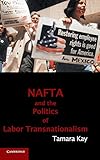NAFTA and the politics of labor transnationalism / Tamara Kay.
Material type: TextSeries: Publication details: New York : Cambridge University Press, 2011.Description: xxvi, 310 p. : ill. ; 24 cmISBN:
TextSeries: Publication details: New York : Cambridge University Press, 2011.Description: xxvi, 310 p. : ill. ; 24 cmISBN: - 9780521762878
- 0521762871
- 331.88097 22
| Item type | Current library | Call number | Copy number | Status | Date due | Barcode | Item holds | |
|---|---|---|---|---|---|---|---|---|
 Books
Books
|
Library, Independent University, Bangladesh (IUB) IMT Shelves (Level 4) | 331.88097 K231n 2011 (Browse shelf(Opens below)) | 01 | Not For Loan | 023833 |
Browsing Library, Independent University, Bangladesh (IUB) shelves, Shelving location: IMT Shelves (Level 4) Close shelf browser (Hides shelf browser)
| No cover image available |

|

|

|

|

|

|
||
| 331.5440954 S67812 2009 Social protection and livelihoods : marginalised migrant workers of India and Bangladesh / | 331.6968073 G6332m 1994 Mexican American labor, 1790-1990 / | 331.80973 D5538i 1987 Industrial democracy in America : ideological origins of national labor relations policy / | 331.88097 K231n 2011 NAFTA and the politics of labor transnationalism / | 332/.097209049 E26m 1997 Mexico 1994 : anatomy of an emerging-market crash / | 332 S8973m 1998 Mad money : when markets outgrow governments / | 332.04150973 M8751t 2008 The trillion dollar meltdown : easy money, high rollers, and the great credit crash / |
Includes bibliographical references (p. 285-302) and index.
Introduction: NAFTA and labor transnationalism -- Part I. The Emergence of Transnationalism: Labor nationalism: diplomacy and distance among unions prior to NAFTA; NAFTA as catalyst: constituting transnational actors and interests; Constituting transnational labor rights; Seizing the opportunity NAFTA provided -- Part II. Variations in Transnationalism: Missing the opportunity NAFTA provided; Explaining variation in the emergence of labor transnationalism -- Part III. Conclusions: Global governance and labor transnationalism.
"How did NAFTA catalyze solidarity among U.S., Canadian, and Mexican unions? By showing how transnational laws and governance institutions constrain and expand transnational social movements, this book argues that, collectively, unions can help shape how the rules governing the global economy are made"-- Provided by publisher.
"When NAFTA went into effect in 1994, many feared it would intensify animosity among North American unions, lead to the scapegoating of Mexican workers and immigrants, and eclipse any possibility for cross-border labor cooperation. But far from polarizing workers, NAFTA unexpectedly helped stimulate labor transnationalism among key North American unions and erode union policies and discourses rooted in racism. The emergence of labor transnationalism in North America presents compelling political and sociological and puzzles: How did NAFTA, the concrete manifestation of globalization processes in North America, help deepen labor solidarity on the continent? And why did some unions more readily engage in transnational collaboration and embrace internationalism than others? In addition to making the provocative argument that global governance institutions can play a pivotal role in the development of transnational social movements, this book suggests that globalization need not undermine labor movements: collectively, unions can help shape how the rules governing the global economy are made"-- Provided by publisher.
Program of Development Studies
